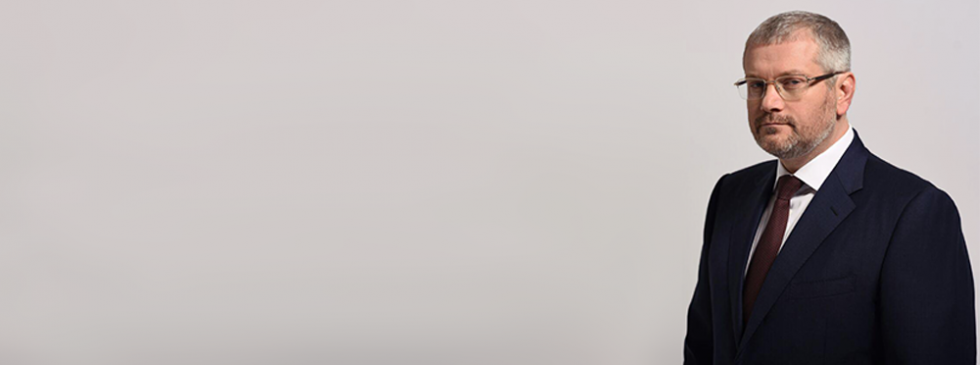Biography
1. Biography
OLEKSANDR VILKUL
Date and place of birth: 24 May 1974, Kryvyi Rih
Tel. +38-044-255-37-01
Education:
2010 – 2012 Dnipropetrovsk Regional Institute of Public Administration, National Academy of Public Administration, Office of the President of Ukraine, specialty – Public Administration
1991 – 1996 Kryvyi Rih Technical University, specialty – Open Pit Mining, Mining Engineer
Professional experience:
In 1996, I started my career as an Assistant of Engine Driver of excavator at the Southern Iron Ore Enrichment Works. Then I took a position of Mining Supervisor, Head of the Department, Deputy Director General. In 2001-2002, I was the Vice President for Economics and Foreign Economic Relations of the Academy of Mining Sciences of Ukraine. In 2002-2003, I was the Deputy Chairman at Southern Iron Ore Enrichment Works. In 2003-2006, I was the General Director of Central Iron Ore Enrichment Works and then the General Director of Central Iron Ore Enrichment Works (CGOK) and the Honorary President of Northern Iron Ore Enrichment Works (Northern GOK).
In 2006, I was elected as an MP of the 5th convocation. I was elected as the Vice Chairman of the Verkhovna Rada Committee on Industrial and Regulatory Policy and Entrepreneurship. Upon early parliamentary election in 2007, I became an MP of Ukraine of the 6th convocation.
In 2010, I was appointed as the Chairman of Dnipropetrovsk Regional State Administration. In November 2010, I was elected by the majority districts, receiving 83.17% votes of support as Deputy of Dnipropetrovsk Regional Council.
From December 2012 to 27 February 2014, I was the Vice Prime Minister of Ukraine for Regional Development, Housing and Public Utilities and Infrastructure. In 2014, I launched an NGO and became the Chairman of the Ukrainian Perspective Foundation, which provides aid to injured soldiers of the Ukrainian army and IDPs.
Since November, 2014 I have served as an MP of the 7th convocation, while being a Member of the Committee on European Integration, in the Group of Parliamentary Contacts with the Federal Republic of Germany, Switzerland, Great Britain, Belarus, China, the US. I am the Head of the Group of Parliamentary Contacts with Serbia.
Achievements:
In the course of my work, Dnipropetrovsk became a Member of the Association of European Regions. I participated in the conferences conducted by the AER, in the meetings with the members of the European Parliament in Brussels, meeting with the OSCE monitoring mission, UNICEF, the International Conference in Support of Ukraine, diplomatic forums and round-table discussions. I held great number of meetings with European leaders on the issues of local government, investment, implementation of European practices.
Thanks to my efforts in creating recognizable and quality national brand of Petrykivka painting as a traditional Ukrainian decorative-ornamental artistry, UNESCO has decided to include Petrykivka painting into the List of the Intangible Cultural Heritage of Humanity. It was the first time Ukraine was awarded such an honorary status.
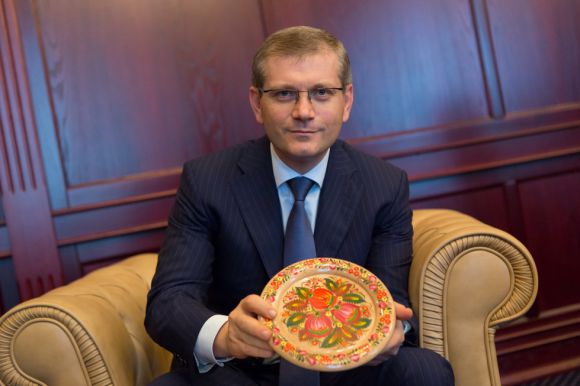
While holding the office of the Vice Prime Minister of Ukraine, I was also the Secretary of the Organizing Committee on preparation and holding of the finals of the European Basketball Championship EuroBasket 2015 in Ukraine, the Head of the Organizing Committee for preparing of Ukraine's application to host the Winter Olympics in Lviv in 2022, the Head of parliamentary contacts with Germany, Poland, Georgia and Armenia.
Awards:
2005 - title of an Honoured Worker of Industry of Ukraine
2008 - Order of Merit of the 3rd class for substantial contribution to the development of mining and smelting industry
2009 - medal for Substantial Contribution to Development of Dnipropetrovsk Region
2011 - Order of Merit of the 2nd class
- winner of the national award Person of the Year in the Regional Leader category
2013 - State Prize of Ukraine in Science and Technology
According to the weekly newspaper Comments, in 2010 I was recognized as the best Governor in Ukraine. I have been among the top ten managers of Ukraine according to the TOP-100. Best Top Managers of Ukraine and Guard of Leaders five times.
2. Achievements as the Governor of Dnipropetrovsk Region
- Against the backdrop of the global financial and economic crisis, industrial production in Dnipropetrovsk Region experienced growth. In 2010-2012, it was +24% (+16,1% in 2010, +5.4% in 2011, +2.2% in 2012). Since 2010, 236,000 new jobs were created in Dnipropetrovsk Region.
- In 2010-2013, the standard of wages in the region almost doubled: from USD 245 to USD 414, rate of exchange was UAH 8 per dollar. The average salary at the companies of basic industries (metallurgy, engineering), especially MMC, exceeded USD 500 and even USD 625 at many others. Moreover, taking into account the crisis in the country, the reduction of wages was prevented in 2013.
- Wage arrears were reduced by almost 11 times (by USD 9,860,000 down to USD 975,000). Tens of thousands of people were able to receive the money they earned. It was the best indicator in Ukraine.
- In 2010-2013, even during stagnation of the world markets, more than USD 2 billion were attracted to the economy of the region. As of 1 January 2013, the amount of attracted direct foreign investments in the economy of the region exceeded USD 8.9 billion. According to this indicator, Dnipropetrovsk Region became a leader among other regions of Ukraine. Every sixth dollar invested by foreign investors in Ukraine was in Dnipropetrovsk Region.
- In 2010, the Dnipropetrovsk Regional Investment Agency was founded. Every investor who wanted to work in Dnipropetrovsk Region received a personal Account Manager from the Agency for supporting the project at all stages – from development to implementation.
Key projects in infrastructure, housing, education, health, spirituality and culture
With Oleksandr Vilkul as the Governor, more than 2,000 new facilities were put into operation, including kindergartens, schools, health care institutions, housing facilities.
- More than 6 million square meters of roads were repaired and built, in particular, Naberezhna Zavodska Street was completely renovated — the third part of the longest embankment in Europe, as well as other traffic arteries of the city.
- The bypass road, including the construction of the southern bypass around Dnipropetrovsk and right exit of Kaydaksky Bridge, became the most ambitious infrastructure transportation project not only in Dnipropetrovsk but in the whole region during the years of independence. Until 2011, Dnipropetrovsk was the only regional centre in Ukraine which had no bypass roads. Under the leadership of Oleksandr Vilkul the first stage of the bypass road (18 km) was built. 70% of the second stage was built from the Zaporizhzhia Highway to the Pivdenny (South) Bridge.
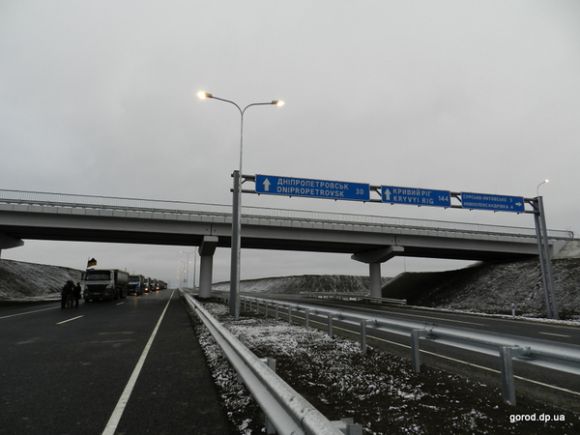
- Affordable housing programmes were implemented. 63-apartment house became the first building in Ukraine to be constructed and commissioned under affordable housing programmes in Dnipropetrovsk as a part of construction of a new neighbourhood with affordable housing. More than 700 apartments were granted to public sector workers – mainly teachers and doctors – for free.
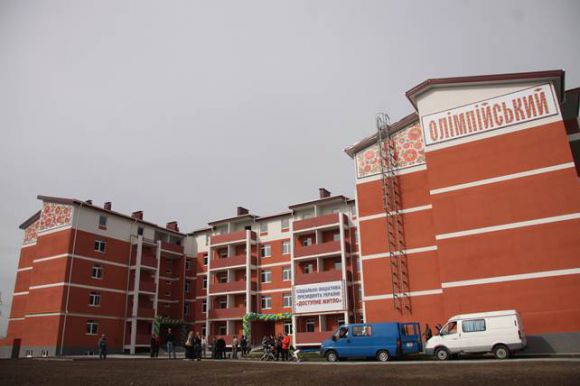
- To ensure public safety, a system of continuous street patrols was implemented in Dnipropetrovsk. For this purpose, 115 new patrol vehicles were acquired within 4 years: jeeps equipped with GPS navigation systems and advanced communicators.
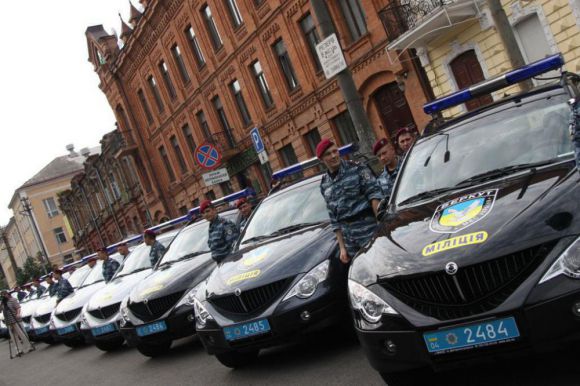
- In 2012, a ground-breaking children's camp was opened in Dnipropetrovsk, the Children's Centre of Social Rehabilitation Perlyna Prydniprovia. Each year, about 3,000 children are rehabilitated and improve their health there, including orphans, children deprived of parental care, children from large families and children of other benefit-entitled categories.
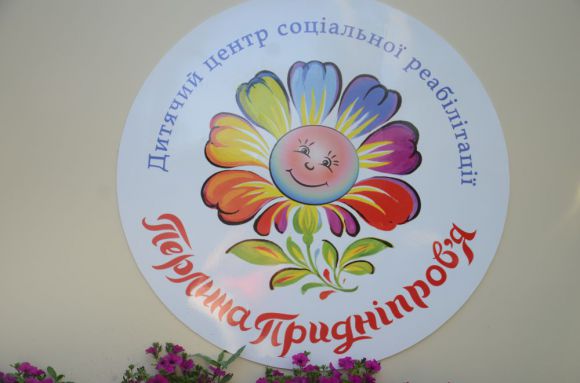
- For the first time in 10 years, we have opened three new rural schools. All schoolchildren and teachers in rural areas were provided with free transportation. 120 kindergartens and educational complexes were commissioned, providing over 11,000 new places in preschool institutions. All kindergartens in the cities of regional subordination were equipped with water purification systems.
- The first Ukrainian comprehensive system of perinatal care was implemented in Dnipropetrovsk. It includes a wide network of interdistrict maternity centres, three neonatal centres, as well as two new modern perinatal centres in Kryvyi Rih and Dnipropetrovsk, designed for 7,000 births per year.
- The most modern city cancer centre in Ukraine was opened in Dnipropetrovsk. Over 560 new cars for doctors, including 170 Peugeot and Ford ambulances were purchased. Within four years, more than 20,000 units of new medical equipment were acquired, including modern CT scanners and other high-tech equipment.
- Development of emergency medical care in the region, including the purchase of modern mobile ICUs, allowed transporting new-born weighing 500 grams or more. As a result, the number of healthy births without complications doubled in the region.
- Under the leadership of Vilkul, the best international standards of e-governance, efficiency and transparency of the authorities were actively introduced and developed in the region. The first Ukrainian large-scale project “Electronic region” was implemented in Dnipropetrovsk Region together with Microsoft Company. It provides the introduction of e-governance in all spheres of life: from healthcare to environmental safety.
- The Ukrainian International Music Festival Best City was held in Dnipropetrovsk. After two years, this festival became one of the most powerful tools of promotion of Ukraine abroad. In the summer of 2013, it had more than 70,000 visitors from all over Ukraine and featured guests from 10 countries of the world.

- In 2012, comprehensive restoration of the unique wooden architectural monument of the 18th century – the Holy Trinity Cathedral, the largest project in Ukraine and Europe, was initiated in Novomoskovsk, Dnipropetrovsk Region. This masterpiece of Ukrainian wooden church architecture was built without a single nail. The church is considered as one of the national spiritual symbols of the Ukrainian people.
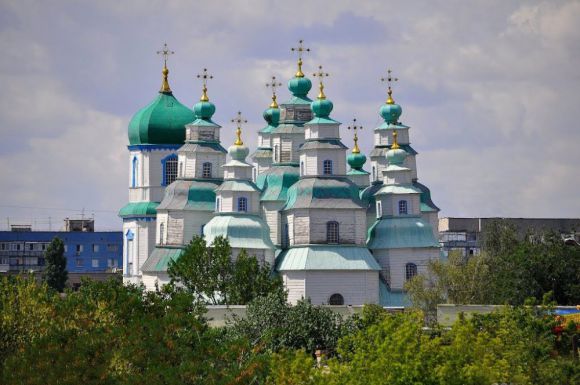
International activities
- At the initiative of Oleksandr Vilkul, Dnipropetrovsk Region became a full member of Assembly of European Regions in December 2011, and a member of the Bureau of the Assembly of European Regions (the Executive body of AER) in 2013.
- In 2012, as a part of a large-scale road show, the investment potential of Dnipropetrovsk Region was presented at the leading investment platforms – the US, Japan and Europe. The goal was to strengthen international image of Dnipropetrovsk Region and Ukraine, as well as to attract foreign investments to the region.
Three significant international events were held in Dnipropetrovsk Region, including business-forum Investment Wave, international interregional forum under the European Union's Eastern Partnership programme, which was held outside of the EU for the first time, and international presentation of Petrykivka painting, which was later included to the List of the Intangible Cultural Heritage of Humanity by UNESCO. With the aim of promoting Ukrainian culture by Oleksandr Vilkul and as the result of multi-year project’s implementation, on November 29, 2016 in Addis Ababa (Ethiopia), the Intergovernmental Committee for the Safeguarding of the Intangible Cultural Heritage voted for the inclusion of Cossack songs of Dnipropetrovsk in the List of World Intangible Cultural Heritage by UNESCO. This year, 48 countries were nominated. Three nominees won and Ukraine is one of these.
3. Achievements as the Vice-Prime Minister
Achievements of Oleksandr Vilkul during his tenure as Vice-Prime Minister of Ukraine, 2012-2014
The Vice-Prime Minister Oleksandr Vilkul was responsible for most complex and problematic sectors: regional development, infrastructure, transport, construction, housing and municipal services, tourism, e-governance.
As the Head of the State Commission on Technogenic and Environmental Safety and Emergency Situations, Oleksandr Vilkul was in charge of the State Emergency Service.
As the Secretary of the Organizing Committee, Oleksandr Vilkul was responsible for preparation of Ukraine for the finals of the European Basketball Championship, EuroBasket 2015. As the Head of the Organizing Committee, he was in charge of bidding to host 2022 Winter Olympics in Lviv. But due to the change of power and the beginning of the military conflict in Donbas, these projects were not implemented despite being fully prepared.
Oleksandr Vilkul headed the Ukrainian party of the Interstate Commissions with Germany, Poland, Georgia, and Armenia.
During only for one year and amid crisis and underfunding, the Vice-Prime Minister Vilkul managed to boost the industries which have been stagnating for years, and to lay the basis for their development.
Regional growth
- In 2013, Oleksandr Vilkul was in charge of a meeting of the Assembly of European Regions committees. The cooperation with AER resulted in establishing a working group for cooperation of Ukrainian regions with AER member regions, spawning many joint projects and boosting cultural relations.
- The Roadmap for Reforming Local Governments was developed, and it was reviewed by 10,000 regional communities. The roadmap provided for decentralization of power and empowerment of the regions, including budget autonomy.
- In 2013, 230 development projects aimed at improving local self-government, introduction of energy saving technologies, modernization of housing and communal services, etc., were implemented in the regions.
- To attract additional funding for projects related to regional development and introduction of energy saving solutions, the cooperation with international financial organizations was initiated on the instruction of Oleksandr Vilkul, particularly with the World Bank, the European Investment Bank, the European Bank for Reconstruction and Development, Nordic Environment Finance Corporation.
- Due to this in 2013 – early 2014, four large-scale international projects on modernization of housing and communal services, regional management, energy saving totalling to more than USD 375 million were implemented in 21 cities of 16 regions of Ukraine.
Emergency prevention and response
- The Code of Civil Protection entered into force on 1 July 2013. The Regulation on the Unified State System of Civil Protection was updated (based on global best practices) and adopted. This contributes to enhancing the safety of people and areas in case of emergencies caused by natural and manmade disasters, as well as ensuring coordination of all institutions such as rescuers, utility providers, and volunteers.
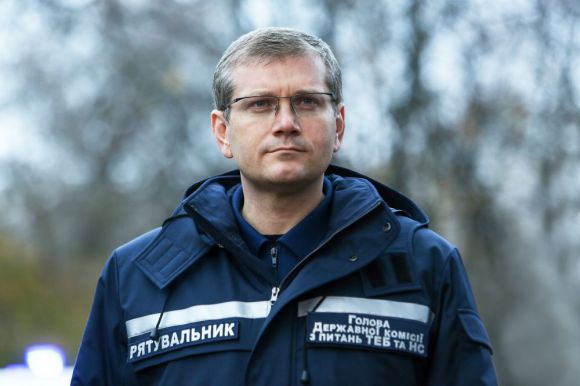
- In the winter of 2013, we experienced the largest snow accumulation over the last 100 years. In Kyiv, the delay of the municipal vehicles led to the collapse. Only after Oleksandr Vilkul began to coordinate the work of all services, the situation was stabilized within a few days.
- Thanks to the preventive measures, emergencies were prevented during floods in the spring of 2013 when the main rivers has big passages of water - the Dnipro, the Dniester and the Danube.
- Heat, gas, electricity and water were consistently supplied to the Ukrainian homes, rescuers provided timely assistance.
Infrastructure projects
- A large-scale railway project of international importance was launched in 2013 – the construction of a new double-track rail Beskyd Tunnel in the Carpathian Mountains (instead of the old tunnel built in the mid-19th century). The goal is to boost trade with Europe.
- A real achievement in the aviation was the initialling of the Agreement between the EU and Ukraine on Joint Aviation Space and Open Sky at the Eastern Partnership Summit in Vilnius.
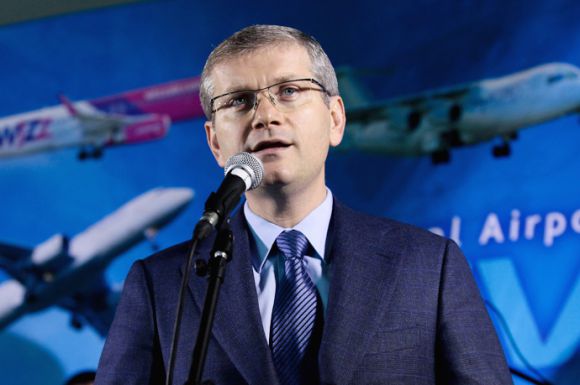
- International projects of container trains were launched, including ZUBR having the route Ilichevsk-Tallinn through the territory of four countries, namely Ukraine, Belarus, Latvia, and Estonia. This contributed to the development of container shipping using the transport corridor between the Black Sea and the Baltic Sea. The same can be said about the joint project of railways and marine ports of Lithuania and Belarus, the Viking Combined Transport Train Project. These projects significantly reduce the transportation costs by half and reduce the shipping time.
- Consistent efforts on deregulation in the construction industry were made. Ukraine made a huge leap forward in simplifying the procedures for obtaining building permits. Ukraine skipped over 145 points in the World Bank's Doing Business Ranking 2013 (from 186 to 41).
Sports projects
- In 2013, European Youth Basketball Championship was held. FIBA Europe recognized this tournament the best in more than forty-year history of the tournament.
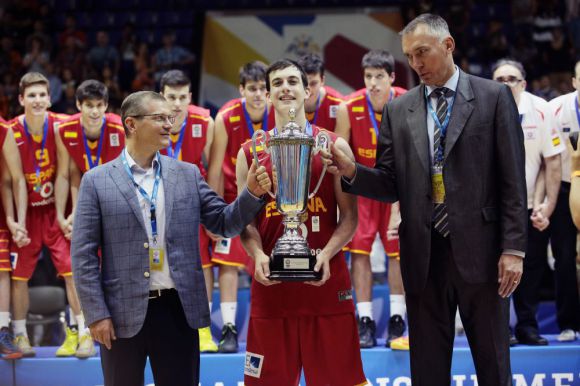
- Preparation for hosting the European Basketball Championship EuroBasket 2015 involved large-scale activities, both organizational and those related to implementation of infrastructure projects was done.
- For the first time in the history of Ukraine, a large-scale project Olympic Dream was initiated to win the bid to host Winter Olympic and Paralympic Games in Lviv in 2022. It could become a catalyst for the development of Ukrainian sports, as well as to promote infrastructure in the Carpathians for 20-30 years ahead.
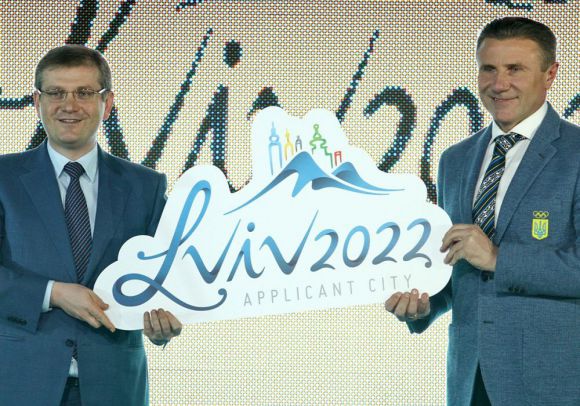
4. Achievements as the MP
In November 2014, at the extraordinary elections to the Verkhovna Rada, Oleksandr Vilkul was elected as an MP of Ukraine of VI convocation. He became the Member of the Committee on European Integration, Head of the Group for Interparliamentary Relations with Serbia, also working in Groups for Interparliamentary Relations with Belarus, the UK, Germany, China, Switzerland, the US.
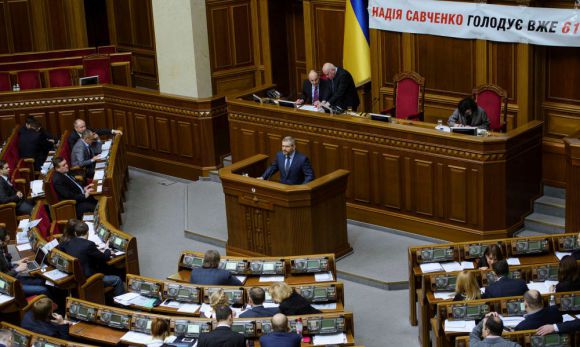
For two years of work in this composition of the Verkhovna Rada, Oleksandr Vilkul submitted 78 bills. The most important ones for Ukrainians include bills on the moratorium on increase of housing and utility tariffs and halving them, on indexation of wages and pensions in line with inflation, on price cap for socially important goods and foods, on renewal of state support for PA Yuzhmash and DO Yuzhnoye as a part the New Industrialization programme, etc.
Another very important bill is a bill on local referendum that will allow citizens to make their own decisions about the name of their city as well as other hot issues for the life of the city and community. But for more than two years, the ruling coalition has been blocking the passage of these vital bills that would bring the country out of crisis and return the normal life to Ukrainians.
5. Ukrainian Perspective Foundation
Doing our best to achieve peace and promote the territorial integrity is a key idea of representatives and volunteers of Oleksandr Vilkul’s Ukrainian Perspective Foundation. It is the first Foundation, which in the summer of 2014 began to provide systematic assistance to ordinary people affected by war including refugees, civilians in the conflict zone and injured persons.
Since its establishment, the Foundation has helped more than 125,000 people in 45 cities of Ukraine including Dnipropetrovsk, Nikopol, Kryvyi Rih, Pavlohrad, Marhanets and other cities and towns of Dnipropetrovsk Region, as well as to residents and displaced persons in the cities and towns of Donetsk and Luhansk Regions controlled by Ukraine. People are provided with food, drugs, kits for newborns, home appliances. More than 860 tons of aid have been allocated.
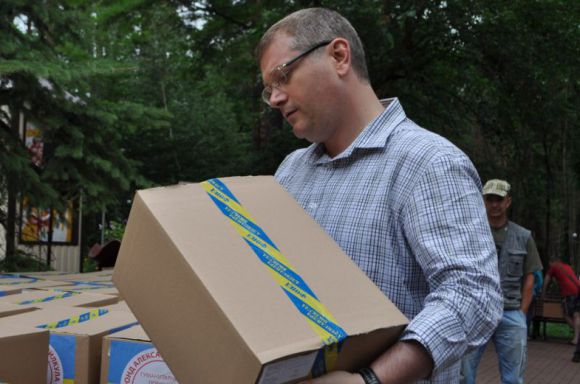
In particular, more than 1,000 families of displaced persons whose children were born in the Dnipropetrovsk Region have already received aid from the Foundation. Kit for newborns contain diapers, clothes, napkins, bottles, pacifiers, creams, powders, shampoos and other personal hygiene product.
Aid is provided to dozens of civilian and military hospitals where injured soldiers are treated. More than 60 tons of aid was allocated since the beginning of the Foundation activities.
The volunteers of the Foundation help both war victims and those suffering because of the actions of the current government. Aid is provided to veterans of the Second World War, single pensioners, disadvantaged population, disabled persons, large families, family-type orphanages, residential care facilities in Dnipropetrovsk Region. For more than two years, the Foundation has provided more than 150 tons of aid to those who need it through the Red Cross. Since 2014, thanks to the management and staff of the Red Cross, the Foundation has provided food and daily necessities to thousands of low-income families and veterans of the Second World War.
An important focus of the Foundation is to support youth and children's programmes. The Foundation has evacuated thousands of children from the conflict zone, provided them with accommodation, food, recreation. More than 500 schoolchildren and students who had left the conflict zone were provided with sets of school supplies. They were transferred to the educational institutions in Dnipropetrovsk Region and provided with accommodation in hostels. 49 children received rehabilitation assistance in Poland and Lithuania.
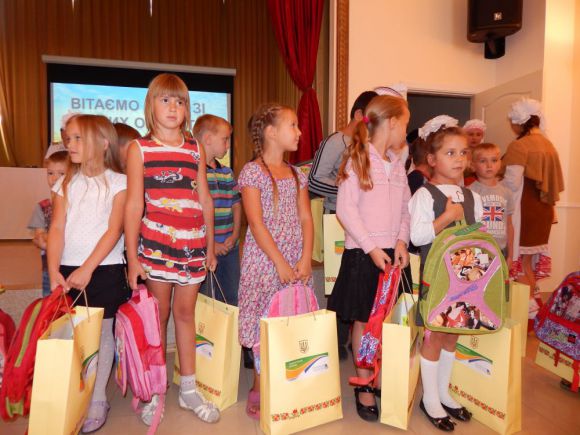
The activities of the Ukrainian Perspective Foundation are not measured by money, hundreds of tons of food, medicine or tens of thousands of kilometres that the volunteers travelled while delivering goods to those who need them. The number of people provided with treatment, food, accommodation is all that matters. We helped many to survive. Such tangible good deeds of volunteers and representatives of the Foundation headed by Oleksandr Vilkul confirm that Ukraine is a united country, and Ukrainians are helping Ukrainians.



